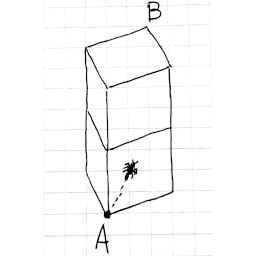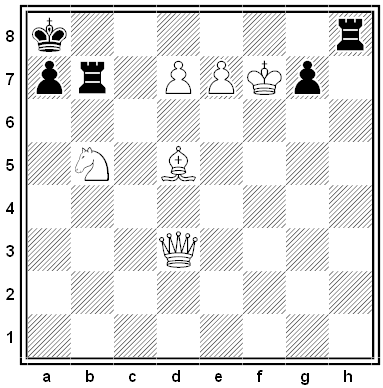Kotani’s Ant Problem

An inquisitive ant sets out from point A at a bottom vertex of the 1 × 1 × 2 box shown above. Of all the possible destinations it might seek in a direct route along the surface of the box, which one requires the longest journey?
Intuitively we might think it’s point B, the farthest vertex on the box roof. But Japanese mathematician Yoshiyuki Kotani discovered that the longest journey actually ends one-fourth of the way along the rooftop diagonal that ends at point B.
This can be seen by “unfolding” the box into a flat diagram, where four different paths can be traced from A to that point. The Pythagorean theorem shows that all four paths have the same length, 2.850…, which is about 0.022 longer than the shortest path to B.
Data scientist Shiro Matsumoto provides some animations here.
(Martin Gardner, “The Ant on a 1 × 1 × 2,” Math Horizons 3:3 [February 1996], 8-9.)
Tricolor

Make an inverted triangle of hexagonal cells with side length 3n + 1, and color the cells in the top row randomly in three colors. Now color the cells in the second row according to these rules:
- If the neighboring cells immediately above are of the same color, assign that color.
- If they’re of different colors, assign the third color.
When you’ve finished the second row, continue through the succeeding ones, applying the same rules. Pleasingly, no matter how large the triangle, the color of the last cell can be predicted at the start: Just apply our two guiding rules to the endmost cells in the top row. If those two cells are both red, the last cell will be red. If one is red and one is yellow (as in the figure above), the bottom cell will be blue.
The principle was discovered by Newcastle University mathematician Steve Humble in 2012. Gary Antonick gives more background here, and see the paper below for a mathematical discussion by Humble and Ehrhard Behrends.
(Ehrhard Behrends and Steve Humble, “Triangle Mysteries,” Mathematical Intelligencer 35:2 [June 2013], 10-15.)
Chamber Music
First Violin: I, in love with the beauty of this world, endow it with my own beauty. The world has no abyss. Streaming out, my heart spends itself. I am only song: I sound.
Second Violin: For me, beside your more ethereal being, it is forbidden to have an I. Not the world — but more firmly and substantially: the earth has taught me. There it is growing dark. Let me accompany you, sister!
Viola: My grey hair makes it my duty to name the abyss for you. As you two childlike kindred spirits skim along, even the quarrel about nothing becomes attractive. But I suffer.
Cello: I know in my heart of hearts, that all is fate, the finely done and the unrelieved. I am true to the whole: enjoy life and repent! I do not warn. I weep with you. I console.
— Josef Weinheber (translated by Patrick Bridgewater)
The Soiled Dove Plea
One morning in 1899, accused Oklahoma prostitute Minnie Stacey was scheduled for trial when the judge found that she had neither an attorney nor the money to hire one. Attorney Temple Lea Houston agreed to defend her and delivered this speech extemporaneously:
Gentlemen of the jury: You heard with what cold cruelty the prosecution referred to the sins of this woman, as if her condition were of her own preference. The evidence has painted you a picture of her life and surroundings. Do you think that they were embraced of her own choosing? Do you think that she willingly embraced a life so revolting and horrible? Ah, no! Gentlemen, one of our own sex was the author of her ruin, more to blame than she.
Then let us judge her gently. What could be more pathetic than the spectacle she presents? An immortal soul in ruin! Where the star of purity once glittered on her girlish brow, burning shame has set its seal and forever. And only a moment ago, they reproached her for the depths to which she had sunk, the company she kept, the life she led. Now, what else is left her? Where can she go and her sin not pursue her? Gentlemen, the very promises of God are denied her. He said: ‘Come unto me all ye that labor and are heavy laden and I will give you rest.’ She has indeed labored, and is heavily laden, but if, at this instant she were to kneel before us all and confess to her Redeemer and beseech His tender mercies, where is the church that would receive her? And even if they accepted her, when she passed the portals to worship and to claim her rest, scorn and mockery would greet her; those she met would gather around them their spirits the more closely to avoid the pollution of her touch. And would you tell me a single employment where she can realize ‘Give us our daily bread?’
Our sex wrecked her once pure life. Her own sex shrink from her as they would the pestilence. Society has reared its relentless walls against her, and only in the friendly shelter of the grave can her betrayed and broken heart ever find the Redeemer’s promised rest.
They told you of her assumed names, as fleeting as the shadows on the walls, of her sins, her habits, but they never told you of her sorrows, and who shall tell what her heart, sinful though it may be, now feels? When the remembered voices of mother and sisters, whom she must see no more on this earth, fall again like music on her erring soul, and she prays God that she could only return, and must not — no — not in this life, for the seducer has destroyed the soul.
You know the story of the prodigal son, but he was a son. He was one of us, like her destroyers; but for the prodigal daughter there is no return. Were she with her wasted form and bleeding feet to drag herself back to home, she, the fallen and the lost, which would be her welcome? Oh, consider this when you come to decide her guilt, for she is before us and we must judge her. They (the prosecution) sneer and scoff at her. One should respect her grief, and I tell you that there reigns over her penitent and chastened spirit a desolation now that none, no, none but the Searcher of all hearts can ever know.
None of us are utterly evil, and I remember that when the Saffron Scourge swept over the city of Memphis in 1878, a courtesan there opened wide the doors of her gilded palace of sin to admit the sufferers, and when the scythe of the Reaper swung fast and pitiless, she was angelic in her ministering. Death called her in the midst of her mercies, and she went to join those she tried to save. She, like those the Lord forgave, was a sinner, and yet I believe that in the days of reckoning her judgment will be lighter than those who would prosecute and seek to drive off the earth such poor unfortunates as her whom you are to judge.
They wish to fine this woman and make her leave. They wish to wring from the wages of her shame the price of this meditated injustice; to take from her the little money she might have — and God knows, gentlemen, it came hard enough. The old Jewish law told you that the price of a dog, nor the hire of such as she, should come not within the house of the Lord, and I say unto you that our justice, fitly symbolized by this woman’s form, does not ask that you add to the woes of this unhappy one, one only asks at your hands the pitiful privilege of being left alone.
The Master, while on Earth, while He spake in wrath and rebuke to the kings and rulers, never reproached one of these. One he forgave. Another he acquitted. You remember both — and now looking upon this friendless outcast, if any of you can say to her, ‘I am holier than thou’ in the respect which she is charged with sinning, who is he? The Jews who brought the woman before the Savior have been held up to execution for two thousand years. I always respected them. A man who will yield to the reproaches of his conscience as they did has the element of good in him, but the modern hypocrite has no such compunctions. If the prosecutors of the woman whom you are trying had brought her before the Savior, they would have accepted His challenge and each one gathered a rock and stoned her, in the twinkling of an eye. No, Gentlemen, do as your Master did twice under the same circumstances that surround you. Tell her to go in peace.
The all-male jury voted to acquit Stacey as soon as they reached the jury room. Some trial attorneys still cite Houston’s “plea for a fallen woman” as the perfect closing argument.
Puppy Love
Con man Joseph Weil once paid a Chicago bartender $10 to watch his dog, saying he had an urgent business meeting. He told him it was a pedigreed hunting dog. He then sent in a confederate, who admired the dog and offered to pay the barman $300 for it. When the bartender said he was only watching it, the confederate left him with a phone number, asking him to call if the dog’s owner proved willing to sell it.
Weil returned, looking downcast and saying that his business deal had fallen through. Sensing an opportunity, the bartender offered to buy the dog for $250. Weil declined at first, but the barman persisted, and eventually the deal was struck. Weil departed with the money, the phone number turned out to be fake, and the dog was an unsaleable mutt.
Weil claimed to have earned $8 million over the years in schemes defrauding greedy gamblers and stock manipulators. “Each of my victims had larceny in his heart,” he wrote. “I never fleeced anyone who could not afford to pay my price for a lesson in honesty.”
Helly’s Theorem
The Great Raft

For more than half a millennium, between the 12th century and the 19th, an enormous log jam clogged the Red River in the Southern United States. By the early 1830s, it stretched more than 160 miles, with new logs and vegetation accreting at its upper end while older material decayed and washed out at the lower.
By the start of the 19th century the mass was blocking settlement in the area west of Shreveport, so the U.S. Army Corps of Engineers hired steamboat entrepreneur Henry Miller Shreve, who spent nine years clearing a navigable path using specially designed “snag boats.”
A grateful public named the city of Shreveport after him, but a second raft soon began to form upstream, extending eventually as far as the Arkansas state line. That would have to be removed as well.
(Thanks, Kevin.)
Math Notes
s = 1 + 2 + 4 + 8 + 16 + ... = 1 + 2(1 + 2 + 4 + 8 + ...) = 1 + 2s, so -1 = 1 + 2 + 4 + 8 + 16 + ...
(Regular summation gives a sum of infinity, but the idea above does make a certain sense.)
(Thanks, Murtadha.)
Impromptu
If the man who turnips cries
Cry not when hs father dies,
‘Tis a proof that he had rather
Have a turnip than his father.
— Samuel Johnson


